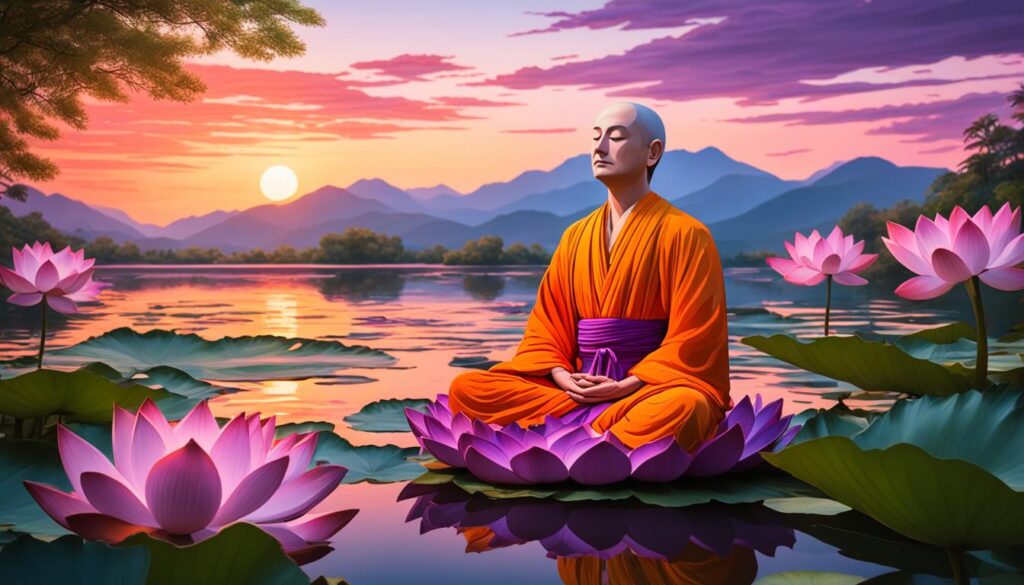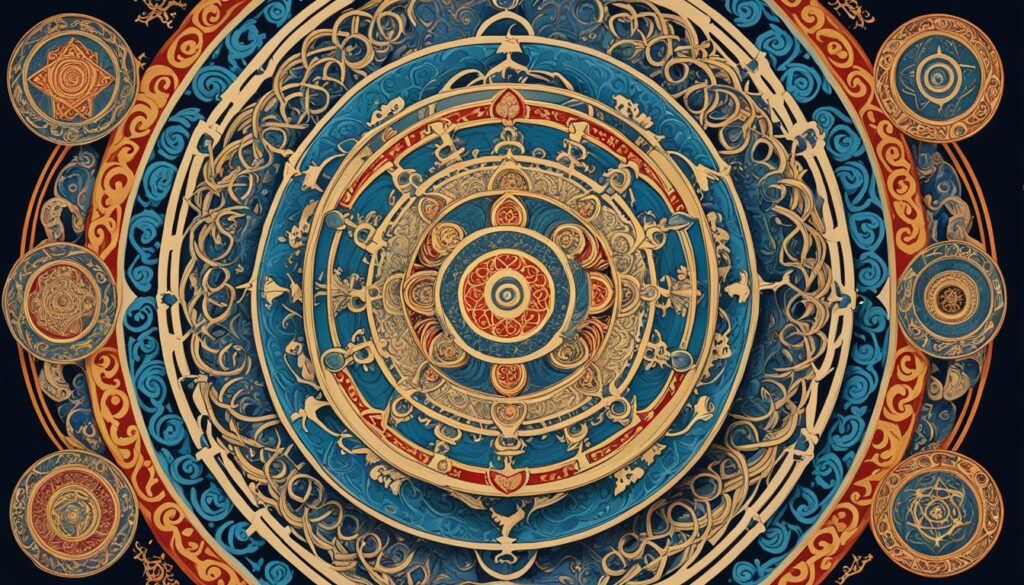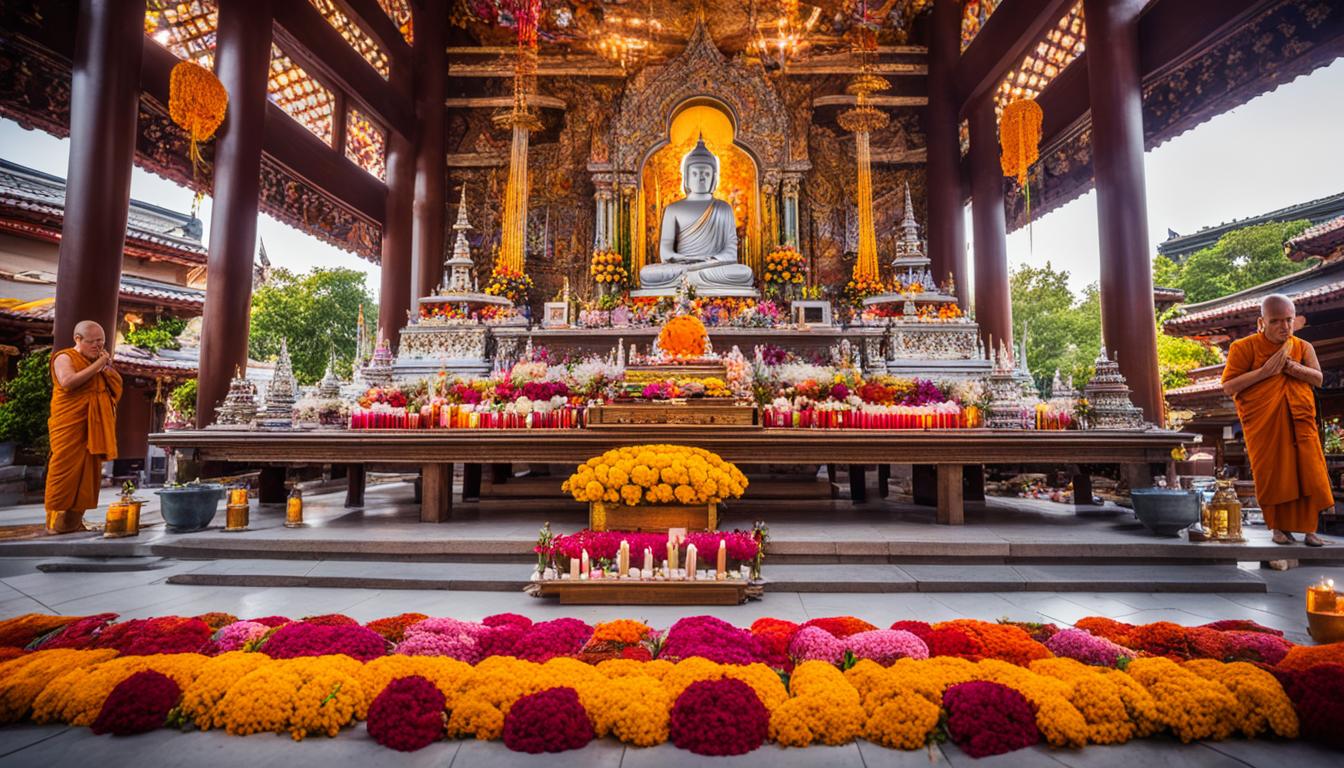When faced with loss and grief, we often turn to ancient traditions and rituals for solace and guidance. In the realm of funeral customs, Buddhist traditions offer a unique perspective on death and the afterlife. Have you ever wondered how Buddhist funeral rituals bring comfort and meaning to those who mourn? Or how these customs navigate the eternal mysteries of life and death? Let’s delve into the world of Buddhist funeral customs, where respect, reflection, and compassion intertwine to create a serene farewell.
Key Takeaways:
- Buddhist funeral customs embody respect, reflection, and compassion.
- Buddhism teaches the concept of saṃsāra, the eternal cycle of existence.
- A Buddhist funeral ceremony consists of chanting, prayers, eulogies, and symbolic offerings.
- Attending a Buddhist funeral requires observing etiquette and offering condolences.
- Understanding Buddhist funeral customs can provide insight and comfort during times of loss.
Buddhist Belief and Concept of Death (Saṃsāra)
The Buddhist perspective on death revolves around the concept of saṃsāra, the eternal cycle of existence. According to Buddhism, life is a series of interconnected births, lives, deaths, and rebirths shaped by the law of karma. Death is not an endpoint but a transition to another life and a step towards nirvana, the ultimate goal of freedom from desires and suffering. Buddhist funeral practices reflect this belief by guiding the departed through their transitional phase to aid their journey toward a positive rebirth.
Embracing the Eternal Cycle of Existence
In Buddhist belief, death is not seen as a finality but rather a part of the ongoing saṃsāra, the cycle of existence. This concept teaches that life is continually evolving and connected through an intricate web of karma, the law of cause and effect. The actions and intentions of individuals in their past lives shape their present existence, and their current choices will contribute to future rebirths. Death is just a natural part of this perpetual journey, marking the transition from one life to the next.
Understanding saṃsāra empowers individuals to recognize the impermanence of life and to live consciously, with mindfulness and compassion. It reminds us that our current actions and intentions have far-reaching consequences, not only in this lifetime but in the cycles of rebirths to come. By embracing the eternal cycle of existence, Buddhist funeral practices aim to guide the departed on their journey towards a positive rebirth.
During a Buddhist funeral, rituals and ceremonies are conducted to support the deceased in navigating the transitional phase and to offer spiritual guidance. These practices serve to generate positive energy and merit, assisting the departed in their onward journey. The community comes together to express respect, reflection, and compassion, creating an atmosphere of solace and support for both the departed and the grieving loved ones.
A Path towards Nirvana
Death, in Buddhist belief, is also seen as a steppingstone towards nirvana. Nirvana is the ultimate goal of Buddhist practice and represents the freedom from desires, suffering, and the cycle of rebirth. It is a state of transcendence and enlightenment, where one achieves liberation and attains true peace.
Through the practice of meditation and the cultivation of wisdom and compassion, individuals can gradually detach themselves from worldly attachments and desires. The process of death and rebirth serves as an opportunity for spiritual progress and a chance to move closer to nirvana.
Buddhist funeral practices acknowledge this aspiration towards nirvana. The rituals and ceremonies aim to provide spiritual guidance and support, allowing the departed to traverse the transitional phase with ease and clarity. By honoring the deceased and fostering a positive and peaceful environment, Buddhist funeral practices pave the way for the journey towards ultimate liberation.

Understanding Saṃsāra and the Six Realms in Buddhism
Saṃsāra, the eternal cycle of birth, life, death, and rebirth, is driven by the law of karma. Within this cycle, Buddhism identifies six realms that individuals may inhabit based on their karma and actions. These realms represent different levels of consciousness and experiences, each with its own unique qualities and challenges.
The six realms, or ‘lokas,’ are as follows:
- God Realm: In this realm, beings experience immense pleasure, abundance, and power. However, their focus on indulgence and desire can lead to spiritual stagnation.
- Demigod Realm: Beings in this realm possess god-like qualities but are plagued by envy, jealousy, and constant striving for superiority.
- Hungry Ghost Realm: In this realm, beings suffer from insatiable cravings and desires that can never be fulfilled, leading to perpetual dissatisfaction.
- Hell Realm: Beings in the hell realm endure extreme suffering and torment due to their past negative actions.
- Animal Realm: Beings in this realm experience a limited level of consciousness and are driven by instinct and survival, lacking the capacity for spiritual growth.
- Human Realm: The human realm offers the greatest opportunity for spiritual growth and liberation. It allows beings to experience a balance of pleasure and pain, providing the ideal conditions for spiritual awakening.
Buddhists strive to transcend these realms through understanding the nature of saṃsāra and cultivating wisdom. The ultimate goal is to achieve liberation from the cycle, known as ‘moksha’ or ‘nirvana,’ and attain enlightenment. This transcendent state brings an end to suffering and leads to profound peace, freedom, and spiritual awakening.
| Realm | Qualities | Challenges |
|---|---|---|
| God Realm | Immense pleasure, abundance, power | Spiritual stagnation, attachment to desires |
| Demigod Realm | God-like qualities, superiority | Envy, jealousy, constant striving |
| Hungry Ghost Realm | Insatiable cravings, unsatisfied desires | Perpetual dissatisfaction |
| Hell Realm | Extreme suffering, torment | Past negative actions |
| Animal Realm | Instinct, survival | Limited consciousness, lack of spiritual growth |
| Human Realm | Opportunity for spiritual growth | Balance of pleasure and pain |
By gaining a deeper understanding of saṃsāra and the diverse realms within it, Buddhists seek to navigate the cycle of existence, transcend mundane desires and limitations, and embark on the transformative journey towards liberation and enlightenment.

The Buddhist Concept of Karma
Karma, a fundamental principle in Buddhism, asserts that our actions have consequences that shape our present and future experiences. The law of karma states that positive actions lead to positive outcomes, while negative actions result in suffering and negative consequences. Understanding and working with karma is essential in navigating the realms of saṃsāra and progressing towards liberation.
The Significance of Buddhist Funeral Ceremonies
Buddhist funeral ceremonies hold profound significance by embodying respect, reflection, and compassion. These ceremonies provide a sacred space for honoring the departed and offering support to their loved ones. They serve as a bridge between life and the afterlife, addressing the mysteries of existence and death while fostering a sense of interconnectedness among the living.
At the heart of Buddhist funeral ceremonies lies the recognition of impermanence and karma. Through the rituals and practices, attendees are reminded of the transient nature of life and the impact of their actions. Reflection on impermanence and karma encourages self-awareness and contemplation, prompting individuals to live meaningful lives and cultivate positive energy.
Respect and merit are fundamental aspects of Buddhist funeral ceremonies. By attending and actively participating, family and friends pay homage to the departed and generate positive karma through their actions. The emphasis on respect extends beyond the individual to encompass the entire community, fostering communal empathy and support.
Compassion plays a central role in Buddhist teachings, and it is no different in funeral ceremonies. Attendees offer condolences, provide emotional support, and lend a helping hand to those grieving. The shared experience of loss creates a space for communal empathy, highlighting the interconnectedness of all beings and the importance of compassion in difficult times.
Honoring the Departed and Reflection on Impermanence
During a Buddhist funeral ceremony, the departed are honored through various rituals and offerings. Chanting, prayers, and eulogies express gratitude for the life lived and guide the departed on their journey to the next realm. Symbolic offerings such as incense and flowers are presented as gestures of respect and remembrance.
Reflection on impermanence serves as a reminder of the fleeting nature of existence. It prompts attendees to contemplate their own mortality and the importance of cherishing each moment. Through this reflection, individuals gain a deeper appreciation for life and are motivated to make the most of their time.

Communal Empathy and Interconnectedness
Buddhist funeral ceremonies bring individuals together, creating a space for communal empathy and support. By sharing in the collective mourning process, attendees find solace in knowing that they are not alone in their grief. The interconnectedness of all beings is recognized and celebrated, reinforcing the importance of compassion and understanding in times of loss.
| Significance of Buddhist Funeral Ceremonies: |
|---|
| Embodying respect, reflection, and compassion |
| Bridging the gap between life and the afterlife |
| Promoting self-awareness and contemplation of impermanence and karma |
| Generating positive merit and communal empathy |
| Honoring the departed through rituals and offerings |
| Fostering a sense of interconnectedness and compassion |
Elements of a Buddhist Funeral Ceremony
A Buddhist funeral ceremony encompasses various elements that hold deep significance in honoring the departed and guiding them through the transition into the next realm. These elements captivate the essence of Buddhist funeral customs, incorporating essential aspects of respect, reflection, and compassion.
Chanting, Prayers, and Eulogies: Setting a Serene Atmosphere
A sacred atmosphere is created through the soulful chanting, prayers, and heartfelt eulogies that resonate within the ceremony. The melodic rhythm of the chants invokes a sense of tranquility and provides spiritual solace to those in attendance. The collective power of the prayers and eulogies serves as a soothing balm for grieving hearts, offering a peaceful farewell to the departed.
The Role of Monks and Officiants: Guiding the Rituals
Monks or officiants play a central role in leading the funeral rituals and ceremonies. Their presence brings a sense of reverence and spiritual guidance to the proceedings. With their deep knowledge of Buddhist teachings and customs, they skillfully navigate the attendees through the stages of the ceremony, ensuring that each ritual is conducted with utmost respect and mindfulness.
Symbolic Offerings: Conveying Respect and Connection
Symbolic offerings are an integral part of a Buddhist funeral ceremony, representing gestures of respect and creating a harmonious connection between the worlds. Candles illuminate the path for the departed, while incense purifies and elevates the spiritual realm. Flowers symbolize impermanence and the transient nature of life, while food items express nourishment and sustenance for the soul.
Reflection on Impermanence and Karma: Embracing Life’s Lessons
Within the ceremony, there is a deliberate reflection on the concepts of impermanence and karma. Through this introspection, attendees are reminded of the transient nature of life and the interconnectedness of all beings. Contemplating the law of karma prompts individuals to recognize the importance of their actions and the profound impact they have on their present and future circumstances.
Compassion and Support: Providing Comfort in Times of Sorrow
A core value of Buddhism is compassion, and it manifests itself in the support and empathy extended to those grieving the loss of a loved one. Buddhist funeral ceremonies serve as a gathering point for the community to come together, offering solace, shared memories, and a collective mourning process. Compassion and support flow freely, providing strength and comfort during this difficult time.
Sharing Merits and Dedication: Supporting the Departed’s Journey
At the conclusion of the ceremony, the practice of sharing merits and dedicating positive energy to the deceased is an expression of love and support. Attendees join together in creating a reservoir of positive energy through acts of kindness, generosity, and compassion. This communal effort aims to provide spiritual support and guide the departed’s journey in the afterlife.
| Element | Description |
|---|---|
| Chanting, Prayers, and Eulogies | Chants, prayers, and eulogies create a serene atmosphere, offering spiritual solace. |
| The Role of Monks and Officiants | Monks or officiants lead the rituals and provide guidance during the ceremony. |
| Symbolic Offerings | Candles, incense, flowers, and food items convey respect and create a connection. |
| Reflection on Impermanence and Karma | Deliberate contemplation on the transient nature of life and the law of karma. |
| Compassion and Support | A collective mourning process that provides comfort and empathy to the grieving. |
| Sharing Merits and Dedication | Communal dedication of positive energy to support the departed’s journey. |
As each element comes together in a Buddhist funeral ceremony, it creates a deeply meaningful and spiritual experience, honoring the departed while providing solace and guidance to those left behind.

Conclusion
Buddhist funeral ceremonies offer solace and guidance during times of loss, providing a comforting space for communities to come together in mourning and the celebration of life. These ceremonies not only honor the departed but also address the universal need for closure, comfort, and hope in the face of grief.
By embracing the cultural diversity of funeral customs, we recognize the strength in unity and find solace in the supportive embrace of our fellow mourners. Buddhist funeral ceremonies, along with the diverse practices of other cultures and religions, remind us of the shared human experience of loss and the profound impact it has on our lives.
In the midst of mourning, we find solace and guidance in the rituals and traditions that provide closure and comfort. From the sacred chanting and prayers to the symbolic offerings, these ceremonies carry deep meaning and offer a sense of connection to something greater than ourselves.
As we navigate the challenging journey of saying farewell to our loved ones, let us embrace diversity and draw strength from our shared experiences. In the midst of mourning, may we find unity and support, knowing that we are not alone in our grief. May these rituals and ceremonies, steeped in ancient wisdom and tradition, provide the solace and guidance we need as we honor and remember those who have passed, embracing both the sorrow and the celebration of life.
FAQ
What is the significance of Buddhist funeral ceremonies?
Buddhist funeral ceremonies embody respect, reflection, and compassion, honoring the departed and addressing the profound mysteries of life and death. They provide a bridge between life and the afterlife, fostering a sense of interconnectedness among the living.
What are the key elements of a Buddhist funeral ceremony?
Elements of a Buddhist funeral ceremony include chanting, prayers, eulogies, the role of monks or officiants, and symbolic offerings. These elements reflect the core aspects of respect and merit, reflection on impermanence and karma, and compassion and support.
How should I dress and behave when attending a Buddhist funeral?
When attending a Buddhist funeral, it is important to dress conservatively, remove footwear, maintain silence and decorum, and offer condolences and support to the bereaved family. These etiquettes show respect for the deceased and their family.
What is the Buddhist perspective on death?
According to Buddhism, death is a transition to another life and a step towards nirvana, the ultimate goal of freedom from desires and suffering. The concept of saṃsāra, the eternal cycle of existence, teaches that death is not an endpoint but a part of the perpetual journey of birth, life, death, and rebirth.
What is the role of karma in Buddhist funeral practices?
Karma, the law of cause and effect, plays a significant role in Buddhist funeral practices. Buddhists believe that the actions and intentions in one’s life shape their karma, which, in turn, determines their experiences in the afterlife and subsequent rebirth. Reflecting on karma helps guide the departed through their transitional phase and aids in their positive rebirth.
How do Buddhist funeral ceremonies provide solace and support during times of loss?
Buddhist funeral ceremonies bring communities together in mourning and celebration of life. They offer solace by addressing the mysteries of life and death, providing guidance for the departed’s journey, and fostering a sense of communal empathy and support.

